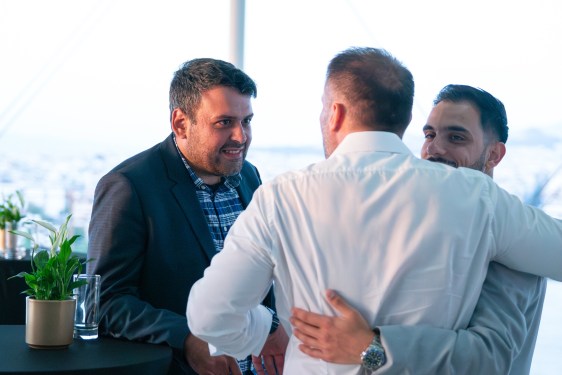In the summer of 2021, Dimitrious Kottas made a move that would be unfathomable to most Silicon Valley engineers. After leaving his coveted position at Apple’s Special Projects Group, he packed up his life in California and moved back to Athens to start a defense company.
Three and a half years later, his startup, Delian Alliance Industries, has deployed solar-powered surveillance towers that monitor Greece’s borders around the clock and detect wildfires on remote islands. The company is also developing other products, including concealed sea drones designed to deter threats.
But Kottas’ most ambitious bet isn’t on any particular technology—it’s the belief that a small Greek startup can break through Europe’s notoriously fragmented defense market. While defense tech is currently booming, Kottas’ journey to founding Delian has been years in the making.
After earning recognition for his academic work on GPS-denied navigation at the University of Minnesota—research he says has been cited over 1,400 times—he joined Apple in 2016. There, he spent six years working on autonomous systems involving cameras, lidars, and radars. Though bound by confidentiality agreements, the technologies he helped develop at Apple’s secretive division clearly influenced Delian’s current projects.
“At the heart of autonomy is perception,” Kottas explained. Machines must not only detect objects but also understand their actions and intentions. “This lies at the heart of autonomy, and since autonomy will be central to future weapon systems, it’s the core technology that will drive change in defense over the next decade.”
His career shift wasn’t solely driven by technology. Geopolitical events—such as the Armenia-Azerbaijan conflict, shifting borders, and the lagging modernization of European militaries—weighed heavily on him. “I literally lost sleep,” he admitted.
Rather than attempting to build next-generation fighter jets, Kottas started with something practical: surveillance towers. The strategy mirrored that of Anduril, a U.S. defense company that initially sold AI-powered surveillance systems to border agencies.
But Delian’s newer products reveal grander ambitions. The “Interceptigon” series includes concealed aerial and sea drones designed to remain dormant until threats emerge. One striking example is a two-meter suicide vessel packed in a cylinder, deployable months in advance on the seabed at depths undetectable by satellites or drones. When activated, it appears “out of nowhere to the enemy,” Kottas said. Delian has patented this approach, using commercial materials to manufacture these weapons at scale and low cost.
This model, unique in the Western defense industry, has attracted investors. Delian recently secured $14 million in funding, led by Air Street Capital and Marathon Venture Capital, bringing its total funding to $22 million.
Despite Delian’s success in Greece, the broader European market remains a challenge. U.S. officials have reportedly pressured European nations to continue buying American-made weapons, while European countries traditionally favor their own defense firms. Some investors believe this fragmentation will hinder startups like Delian from scaling across borders.
Kottas acknowledges the hurdles but points to changing dynamics. He cites EU initiatives like Safe and ReARM Europe, which promote cross-border defense cooperation, as signs of progress. Companies like Portugal’s Tekever and Germany’s Quantum Systems, he argues, prove that European startups can compete globally.
When asked about Anduril, Kottas is respectful but undaunted. “It’s a generational company that will inspire many,” he said. But he cautions against premature predictions, comparing the current state of defense tech to the early days of self-driving cars.
The real test is whether a Greek startup can convince nations like France, Germany, or the U.K. to trust foreign technology with their national security. Kottas recently submitted a bid for a German tender, a trial for his belief that superior tech and competitive pricing can overcome Europe’s decentralized market.
What sets Kottas apart is how personal the mission feels. “It’s different to build weapons in New Mexico that will be used on the other side of the planet,” he said. “But it’s another thing to build something that might save your brother, sister, or neighbor.”
This perspective, shared by many European entrepreneurs who see conflict as a lived reality, drives Delian’s focus on low-cost, scalable, and rapidly deployable systems. It may also persuade other nations that geography matters more than nationality in defense.
Kottas’ unconventional path—from Athens to Minneapolis to Apple and back to Athens—suggests he thrives on long odds. Building a company in a fragmented market, he says, forces resilience, efficiency, and a relentless focus on delivering high-quality tech at low costs.
“I do think fragmentation will be overcome in the coming years,” he said. “And if you play it right, you can turn it to your advantage.”

